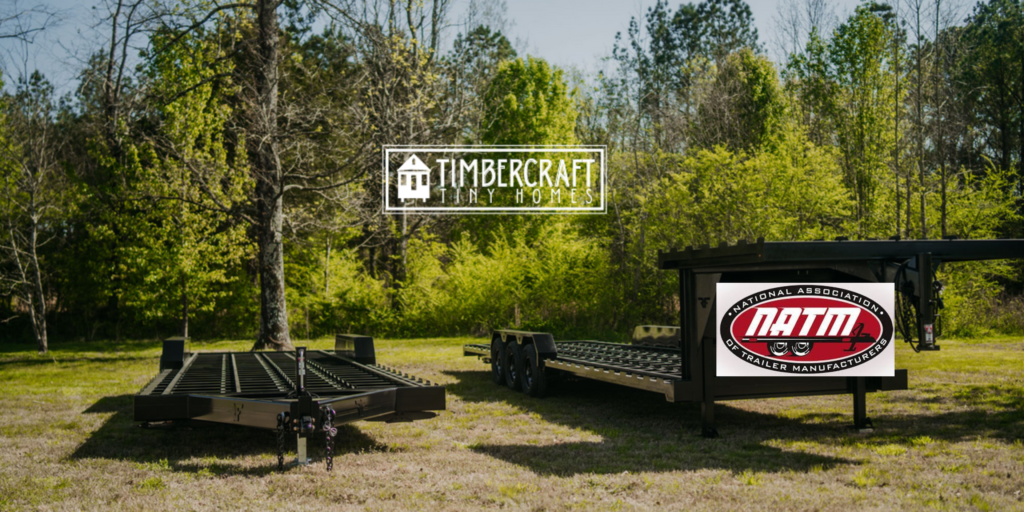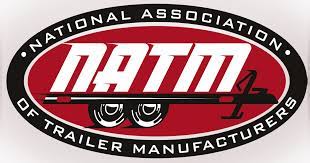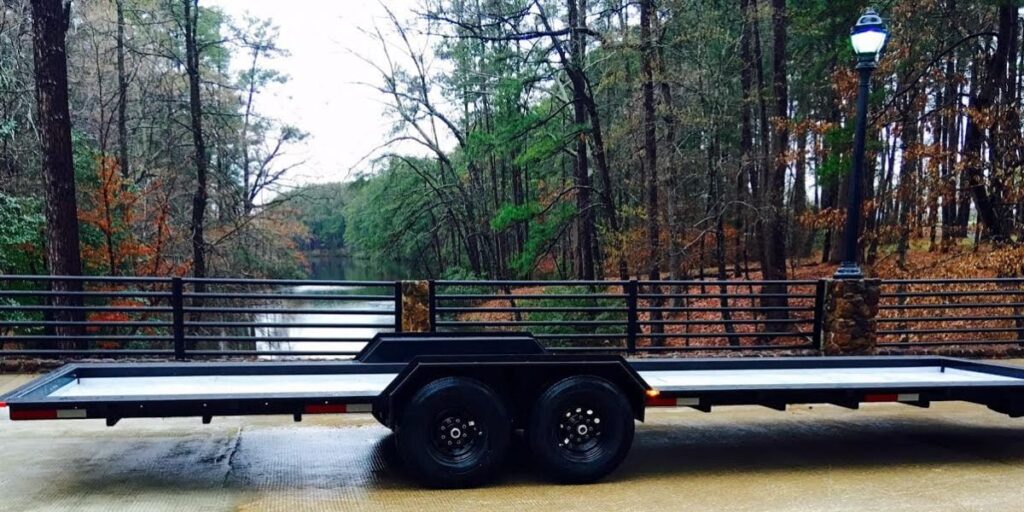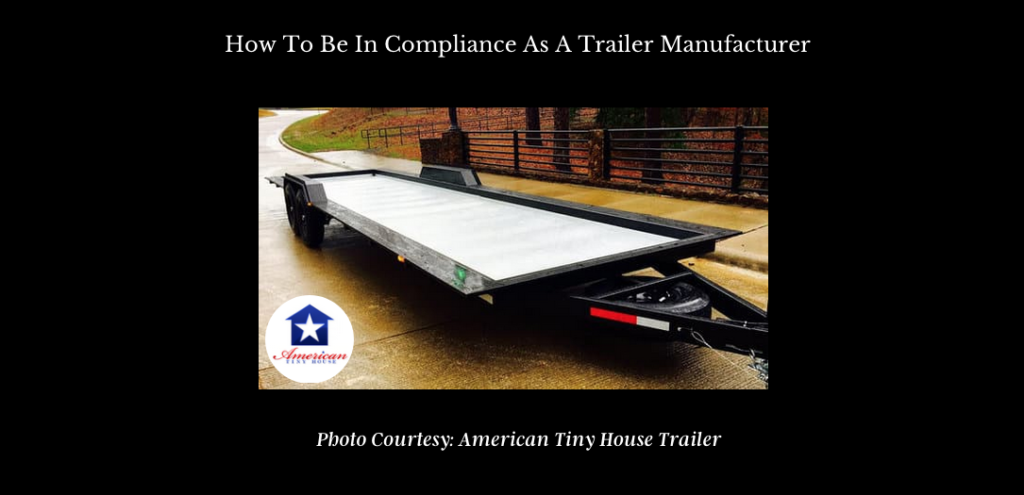The Tiny House Industry Will Establish Itself As A Legitimate Industry
The tiny house industry is fast approaching the road to becoming a legitimate industry that stands separate and out from under the RV, Modular, and Manufactured home industry with the approval of the new ASTM Tiny Houses subcommittee E06.26 within the committee E06. In the simplest of terms, the entire tiny house industry has the opportunity to come together and write and maintain standards specific to tiny houses. The subcommittee will be in existence indefinitely. A primary focus will be a standard on a tiny house on wheels that will include the trailer ( also known as the chassis).

Where To Start If You Are A New Builder Of Tiny Houses On Wheels
There is organization called the National Trailer Manufacturers Association ( NATM ) that will help you with the steps of becoming a new trailer manufacturer to be in compliance with federal and state laws. There are several tiny house manufacturers that are members of NATM, and their trailers bear the NATM decal.
Below I also listed the beginning processes and relevant links to The National Highway Traffic Safety Administration NHTSA, to start the process yourself, starting with a World Manufacturer ID WMI.

Ready Fab Trailers Is A Subsidiary Of Timbercraft Tiny Homes And Is A Member Of NATM And Listed On NHTSA
National Trailer Manufacturers Association ( NATM )

The National Association of Trailer Manufacturers (NATM) has been dedicated to improving trailer safety and performance for more than 30 years. The Association represents manufacturers that produce light- and medium-duty trailers, supplier and service providers, trailer dealers, and tow vehicle OEMs to the industry.
NATM seeks to promote awareness of safety and provide a voice for trailer manufacturers and their suppliers when issues of trailer safety and regulation are considered by
Congress and relevant government agencies. Founded in 1987, the Association has grown to represent more than 1,000 companies belonging to the trailer industry.
NATM is dedicated to improving trailer safety. One way this is accomplished is through the mandatory Compliance Verification Program, requiring all trailer manufacturers to verify they have the manufacturing processes in place to build trailers that meet Federal Motor Vehicle Safety Standards (FMVSS) and industry best practices.
NATM- Building A Trailer?
If you intend to manufacture trailers, there are a number of items you need to consider as well as items that you are legally mandated to complete.
If your trailer will be used on roadways, you are required to do the following:
- Obtain a World Manufacturing Identifier (WMI) from the Society of Automotive Engineers (SAE)
- National Highway Traffic Safety Administration (NHTSA) Registration
- State Registration and Regulation
- Federal Regulations
You will also want to consider the following:
- Finding suppliers and service providers
- Insurance
- Components
- Engineering services
- Warning Labels
We’re Here To Help:
This may all seem overwhelming, but NATM helps its members with this process. As a new manufacturer, NATM can help provide you with the information you need to obtain your WMI and VIN and contact information for your state agency.
Often considered the most significant benefit is the compilation of applicable Federal Motor Vehicle Safety Standards, industry regulations, and best practices which are included in NATM’s Guidelines. This resource is given to each member along with annual updates.
Moreover, NATM compliance consultants visit member facilities every two years to ensure manufacturers have the processes in place to build trailers in accordance with these regulations. For more information about NATM’s Compliance Verification Program, click here.
Trailer Made Custom Trailers LLC
Photo Courtesy Decathlon Tiny Houses Built Upon Trailer Made Trailers
AUTOHAUS OF COLORADO DBA TRAILER MADE CUSTOM TRAILERS LLC: Is Listed On NHTSA As Completed Vehicle Manufacturer, Incomplete Vehicle Manufacturer, Intermediate Vehicle Manufacturer, Final-Stage Vehicle Manufacturer, Vehicle Alterer, Fabricating Manufacturer of Motor Vehicle Equipment
Iron Eagle PAD Series Trailer Foundation
121 Tiny Homes Builds Upon The Iron Eagle PAD Series. Iron Eagle Is Registered With NHTSA
NATM- Buying A Trailer?
As a consumer, it is nearly impossible to fully understand the hundreds of safety-related regulations that trailer manufacturers are required by law to comply with, including lights, trailer capacities, brakes, and much more.
NATM has made it easier on consumers by creating the NATM Decal. Trailers featuring this decal are built by manufacturers who have verified compliance through the NATM Compliance Verification Program.
NATM has compiled the applicable federal regulations and industry best practices and every two years, NATM Compliance Consultants visit member facilities to ensure they have the manufacturing processes in place to build trailers in accordance with these standards.
Participation in this program is MANDATORY for all NATM trailer manufacturing members and only NATM members who have successfully completed the Compliance Verification Program are allowed to place NATM Decals on their trailers.
NHTSA Cautions Buyers that Trailers
Must Meet Federal Safety Regulations
Consumer Alert :August 30, 2022
The National Highway Traffic Safety Administration today warned that noncompliant trailers that may pose a safety risk are increasingly marketed and sold to small businesses throughout the United States. These trailers are often marketed as food trucks or vending stations.
These trailers are only permitted under U.S. law if they are certified as meeting Federal Motor Vehicle Safety Standards. In addition to the potential safety risk posed by noncompliant trailers, people attempting to import them into the country or title and register them with local authorities can incur significant expenses, only to face potential forfeiture of the noncompliant trailers.
NHTSA warns anyone purchasing a trailer to avoid falling victim to sellers of illegal trailers. Trailers that do not comply with Federal regulations may not be safe and are not allowed to enter the United States.
Please be aware that trailers must comply with Federal standards to ensure that they are equipped with appropriate critical safety components, such as lighting, tires and wheels. Only companies registered with NHTSA may manufacture trailers compliant with these standards.
Please use caution when shopping for these trailers, especially if you are considering online listings for trailers that must be imported into the United States. A compliant trailer will have an affixed label indicating it meets all applicable Federal Motor Vehicle Safety Standards.

Photo Courtesy American Tiny House: American Tiny House Partners With Texas Bragg For Their Trailers Which Is Listed In The NHTSA Vehicle Listing Manufacturer Portal
NHTSA Vehicle Listing Manufacturing Portal
In addition, potential trailer buyers should consult the Vehicle Product Information Catalog and Vehicle Listing Manufacturer Portal to determine whether the manufacturer is listed with NHTSA before purchasing a trailer. Click below to access the portal.
Note: Tiny House Manufacturers Often Build Their Own Trailers And Have A Different Name For The Trailer Business Or They Build On A Trailer.
Additional Resources
How To Obtain A World Manufacturer Identifier WMI From SAE
Since 1981, global automotive manufacturers have utilized a complex numbering system called a Vehicle Identification Number (VIN) that uniquely describes a vehicle. This number provides a coded description of the vehicle including: manufacturer, year of production, place of production and vehicle characteristics. Because of our unique position within the mobility industry, SAE International is contracted by the National Highway Traffic Safety Administration (NHTSA), to assign a selected portion of the VIN, specifically called the World Manufacturers Identifier (WMI).
If you produce complete, on-road vehicles in the United States, NHTSA regulations require you to place the complete VIN on your vehicles.
NHTSA:Manufacturer Information

NHTSA is responsible for the management and oversight of Vehicle Identification Number (VIN) specifications across all vehicle-based products. In addition, NHTSA requires that manufacturers, parts manufacturers, tire manufacturers and companies that participate in finalizing vehicles for use on U.S. roads identify themselves through reporting that is governed by CFR 49 Parts 551 to 574. Under these rules manufacturers are required to provide general vehicle specifications and identification marks (e.g., VIN, DOT Code, etc.) to NHTSA, which NHTSA has consolidated and provided for use to the public in the NHTSA Product Information Catalog and Vehicle Listing (vPIC). vPIC can be accessed using the following link:
Welcome to vPIC
The NHTSA Product Information Catalog and Vehicle Listing (vPIC) is a consolidated platform that presents data collected within the manufacturer reported data from 49 CFR Parts 512 – 595 for use in a variety of modern tools. NHTSA’s vPIC platform is intended to serve as a centralized source for basic Vehicle Identification Number (VIN) decoding, Manufacturer Information Database (MID), Manufacturer Equipment Plant Identification and associated data.
NHTSA is responsible for the management and oversight of Vehicle Identification Number (VIN) specifications across all vehicle-based products. In addition, NHTSA requires that manufacturers, parts manufacturers, tire manufacturers and companies that participate in finalizing vehicles for use on U.S. roads identify themselves through reporting that is governed by CFR 49 Parts 551 to 574. Under these rules manufacturers are required to provide general vehicle specifications and identification marks (e.g., VIN, DOT Code, etc.) to NHTSA, which NHTSA has consolidated and provided for use to the public in the NHTSA Product Information Catalog and Vehicle Listing (vPIC). vPIC can be accessed using the following link:
vPIC is designed to provide users a full range of tools to view submittals, decode VINs and a set of application programming interfaces (APIs) for development purposes. All data is provided from the manufacturer directly to NHTSA and is added to the interfaces once reviewed and accepted. Manufacturers are required to submit details on their activities and/or products at least 60 days prior to start, which includes production of new vehicles. NHTSA uses this data for analysis, regulatory and research purposes to improve vehicle safety on the roads as well as to communicate with manufacturers about specifics on their vehicles or vehicle-based products. To support the Open Data Initiatives of the Federal Government NHTSA developed vPIC, which allows researchers, public users and industry the ability to use the same data the Agency uses so that a common data standard can be leveraged across vehicle safety research areas.
Manufacturer Requirements – Reporting Requirements
Information on Manufacturers of vehicle products intended for sale within the United States for both foreign and domestic manufacturers is required to be submitted to NHTSA for self-certification and reporting purposes within 60 days of official production of a vehicle or vehicle-based product intended for operation on U.S. roads using one of the approved methods as indicated below. For non-US companies, the sale, importation and or operation of vehicles from foreign companies must first conform to CFR 49 Part 551, which requires that a company designate a U.S. Agent for Service of Process that will be the primary contact for the company in the event of a safety issue. While the option to submit using U.S. Postal or hardcopy is still a valid mechanism to send documentation to NHTSA the Agency highly encourages manufacturers to use the new vPIC Manufacturer Portal within vPIC to submit. Using the vPIC Manufacturer Portal is intended to streamline the process by allowing manufacturers the ability to submit directly to NHTSA electronically the same data that would be sent in via paper, but in a way that allows for review and discussion to occur without significant delays that can occur through the mail. To use the vPIC Manufacturer Portal please use the following link:
Vehicles Built in Two or More Stages Final Rule
A Rule by the National Highway Traffic Safety Administration on 02/14/2005
Agency :National Highway Traffic Safety Administration (NHTSA), DOT.
The final rule amends four different parts of title 49 to address the certification issues related to vehicles built in two or more stages and, to a lesser degree, to altered vehicles. The amendments allow the use of pass-through certification so that it can be used not only for multi-stage vehicles based on chassis-cabs, but also for those based on other types of incomplete vehicles. The amendments also create a new process under which intermediate and final-stage manufacturers and alterers can obtain temporary exemptions from dynamic performance requirements, and provide an automatic one year of additional lead time for new safety requirements for intermediate and final-stage manufacturers and alterers, unless the agency determines with respect to a particular requirement that a longer or shorter time period is appropriate. This final rule also refines the agency’s interpretation of “vehicle type” to more appropriately reflect the congressional and judicial considerations. Because vehicles built in two or more stages are more properly considered a “vehicle type,” the agency will be able more properly to consider the benefits and burdens of various compliance options when developing Federal motor vehicle standards.
Code Of Federal Regulations
Displaying title 49, up to date as of 12/12/2022. Title 49 was last amended 11/17/2022.
PART 568 – VEHICLES MANUFACTURED IN TWO OR MORE STAGES – ALL INCOMPLETE, INTERMEDIATE AND FINAL-STAGE MANUFACTURERS OF VEHICLES MANUFACTURED IN TWO OR MORE STAGES
Engineering The Trailer
As NATM suggested, if you are going to start manufacturing a trailer or a tiny house on wheels, please look into the services of an engineer. PSE Consulting Engineers is an company that I highly recommend and is experienced in the design and engineering of tiny houses and the trailer. Nabil Taha is the principle founder and they are licensed in all 50 states as well as the Canadian provinces of Alberta, British Columbia, Ontario, & Saskatchewan. They have also completed numerous international projects.
Learn More About PSE Consulting Engineers
Titling And Registration
NHTSA is not responsible for regulating the operation of motor vehicles on public roads in the U.S. or for titling or registering motor vehicles for such operation. That is instead the responsibility of the individual States. Some States may require a manufacturer’s certificate of origin (MCO) or manufacturer’s statement of origin (MSO) to register a new motor vehicle. These are not federally required documents. NHTSA, therefore, is not in a position to offer guidance to prospective vehicle manufacturers or vehicle purchasers on obtaining a needed MCO or MSO. Consumers with questions regarding these documents should direct those questions to their State’s Department of Motor Vehicles (DMV). Prospective manufacturers seeking guidance on obtaining MCO or MSO documents should contact the American Association of Motor Vehicle Administrators (AAMVA) at 703-522-4200 or visit that organization’s website at www.aamva.org.
Memo From RVIA: RVIA Manufacturers, Suppliers and Other Interested Parties
Membership Requirement regarding Part 566 of 49 Code of Federal Regulations (CFR)
On February 29, 2016, the RVIA Board of Directors established a requirement that manufacturing
members of the Association must register as vehicle manufacturers with the National Highway Traffic
Safety Administration (NHTSA) to: Administrator, National Highway Traffic Safety Administration,
400 Seventh Street SW., Washington, DC 20590. Although this registration has long been required by
49 Code of Federal Regulations, Part 566, the Board’s action will make this a condition of RVIA
membership as well. The Board sees this step as a way to ensure that all RVIA members building to
NFPA 1192 are truly committed to building vehicles; and that these vehicles are intended to provide
temporary living quarters for recreational camping or seasonal use, not permanent residential living
Maximum Square Foot Size of a Travel Trailer
State law defining the maximum square foot size for a travel trailer is inconsistent. Some states limit a travel trailer to 320 square feet while others set the maximum at 400 square feet. The maximum size of a travel trailer in the National Fire Protection Association’s (NFPA) 1192 Standard on Recreational Vehicles is 400 square feet. The older 320 sq. ft. definition used in some states is outdated and inadequate.
The RV Industry Association supports amending state laws to consistently describe the maximum size of a travel trailer as 400 square feet in the set-up mode.
Oversize/Overweight Load Permits
Permits
The Federal government does not issue permits for oversize or overweight vehicles. This is a State option.
Nondivisible Loads:
Permits may be issued by the States without regard to the axle, gross, or Federal bridge formula requirements for nondivisible vehicles or loads. Nondivisible is defined as any load or vehicle exceeding applicable length or weight limits which, if separated into smaller loads or vehicles, would:
- Compromise the intended use of the vehicle, i.e., make it unable to perform the function for which it was intended;
- Destroy the value of the load or vehicle, i.e., make it unusable for its intended purpose; or
- Require more than 8 work hours to dismantle using appropriate equipment. The applicant for a nondivisible load permit has the burden of proof as to the number of workhours required to dismantle the load.
REQUIREMENTS FOR MANUFACTURERS OF TRAILERS PRODUCED FOR DISTRIBUTION WITHIN THE U.S. MARKET
a person may not manufacture for sale, sell, offer for sale, introduce or deliver for introduction in
interstate commerce, or import into the United States, any motor vehicle or motor vehicle equipment
manufactured on or after the date an applicable motor vehicle safety standard prescribed under this
chapter [49 USCS §§ 30101 et seq.] takes effect unless the vehicle or equipment complies with the
standard and is covered by a certification
This page will be a work in progress as I add more information. If you are a manufacturer, make sure you do your own due diligence in your state or where you ship to. If you are a consumer, make sure the manufacturer you choose is in compliance with federal and state laws.
Stay Tuned!
Tiny House Alliance USA Editor
Janet Thome Founder And President
Dec. 11th,2022
The Future Of Tiny Is Now!
509 345 2013
ja***@******************sa.org

Photo Courtesy American Tiny House


Excellent information. We just can’t stress it enough. You must start with a hi quality trailer or it won’t end well. https://tinylifeconsulting.com/diy-tiny-house-trailers/